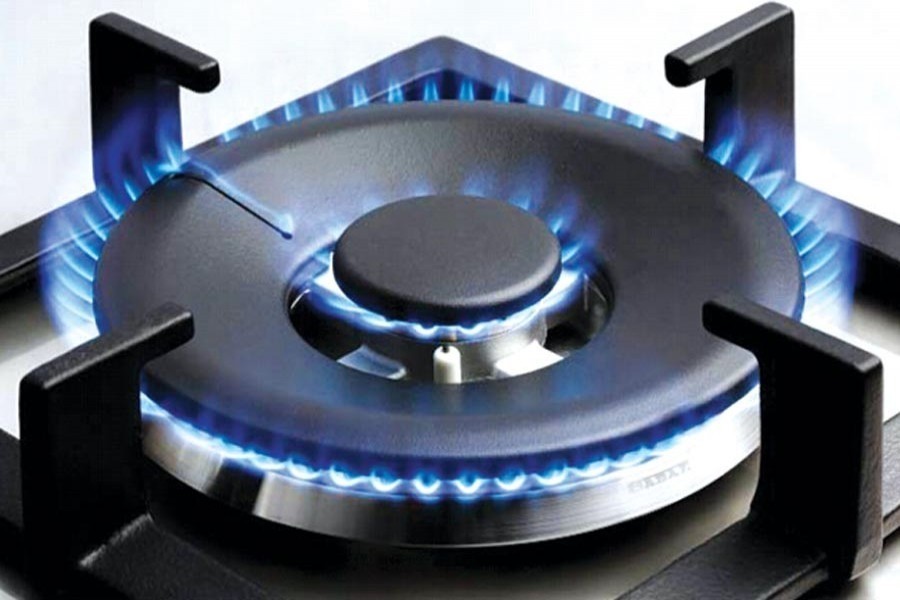
Published :
Updated :

The government envisages first discretionary raise in natural gas tariffs under an amended rule that strips the energy regulator of its authority to hold pre-hike public hearing, sources say.
A senior official of the Ministry of Power, Energy and Mineral Resources (MPEMR) says the express readiness of the country's business community to pay higher to get increased quantity of natural gas has prompted the government to move forward with a plan to raise its tariffs.
"As Bangladesh's domestic natural gas output has been on the wane, the government has no other option but to import 'expensive' liquefied natural gas (LNG) to provide additional natural gas to consumers," the official adds.
He, however, could not say whether the natural gas tariffs will be raised only for industrial consumers or for other consumers, too.
Contract suppliers have already given lukewarm response to Bangladesh government's call to increase the supply of LNG, reflecting a tight demand-supply situation with the fuel.
The long-term suppliers have informed the government that their volumes of LNG supply would be minimal to Bangladesh in 2023, as of the previous year, amid 'volatile' spot-market prices.
Short LNG-supply commitment means the country's overall natural-gas supply next year might further go down if domestic gas output not ramped up or the government does not increases LNG imports from alternative sources, market- insiders foretell.
Country's two existing long-term LNG suppliers - Qatar's Qatargas and Oman's Oman Trading International (OTI) - have committed to providing a total of 56 LNG cargoes in 2023 - as much its import in the current calendar year, 2022.
But, unlike in the current calendar year, the government has not yet decided whether or not it will import LNG from global spot market that looks distorted by war and sanctions.
Bangladesh Energy Regulatory Commission (BERC) last month hiked bulk power tariffs by 19.92 per cent with effect from December.
The commission also received appeal from a number of state-run power distribution companies to raise electricity rates in retail level for end-users.
The BERC will arrange public hearing soon to justify the retail power-tariff-hike proposals, says a senior BERC official.
"As the bulk tariffs are already raised and retail-level power-tariff hike is underway with BERC's jurisdiction, the government is not likely to interfere with the existing power-tariff mechanism with the new ordinance," says the official.
The government has long fixed the prices of petroleum products by executive orders, defying protests from rights groups.
The government usually fixes the prices of diesel, petrol, kerosene, and octane by executive order time to time, while the state-run Bangladesh Petroleum Corporation (BPC) itself fixes the prices of furnace oil, jet fuel and other mineral items.
In a desperate plea to get more gas President of Bangladesh Textile Mills Association, or BTMA, Mohammad Ali Khokon, in a recent press briefing, expressed the millers' readiness to pay higher for industrial gas as much as Tk 25 per cubic metre from the existing Tk 16.33 to facilitate the government to augment LNG imports.
BTMA member-mills are the biggest consumers of gas among industries, who use around 16.62 per cent of the total gas consumed in the country, according to official data.
Mr Khokon said they were running their units at half the capacity because of the gas crisis. And capacity scaling down means lesser production, lesser export and higher product prices.
If the government imports additional LNG worth US$1.20 billion from the international market and the industrial units get adequate gas for six months, the impact would be an additional export worth around US$6-10 billion, Khokon said to explain the business paradox.
Some 60 per cent of Bangladesh's textile mills are at risk of closure owing to gas crisis, he claimed.
Country's apex trade body, the Federation of Bangladesh Chambers of Commerce and Industry (FBCCI), also echoed the similar view.
"This is unfortunate that despite businessmen's intention to pay higher to get increased quantity of natural gas, the government has not yet arranged additional LNG imports," senior vice president of the country's apex trade body Mostofa Azad Chowdhury Babu told the FE.
The government has not yet initiated dialogue with the businessmen either about increased LNG imports, he laments.
To keep the country's economy rolling the government should take the decision immediately to ramp up energy supplies, said the top leader of the FBCCI.
Natural-gas tariffs were last hiked by the BERC by 22.78 per cent from June 1, 2022, raising weighted average natural gas tariffs to Tk 11.91 per cubic metre from Tk 9.70 per cubic metre.
The government issued a gazette notification last week bringing change in the BERC rules. With the amendment, the government can now fix, adjust or readjust electricity and gas prices at the consumer level on its own - for the sake of adjusting its subsidy, public interests, and ensuring uninterrupted energy supply for agriculture, industries, fertiliser, trade and commerce, and domestic purposes, according to the gazette notification.
Other objectives of the amendment are to take prompt steps for enhancing electricity production, energy transmission, marketing, supply, and distribution, it added.
The amendment, however, has been made amid strong opposition and criticism from various quarters.
According to critics, the country's energy regulator will stand abolished, transparency and accountability of power and energy companies in both public and private sectors will be elusive as the government assumed authority to fix energy tariffs.
Millions of consumers across Bangladesh will be directly affected, while the private and publicly owned energy and power entities will reap benefit as a consequence, they said
Raising energy tariffs bypassing BERC and without holding any public hearing will reduce transparency and accountability, experts said, adding that the amendment will help in "misuse of public money" in public entities and increase project costs.


 For all latest news, follow The Financial Express Google News channel.
For all latest news, follow The Financial Express Google News channel.